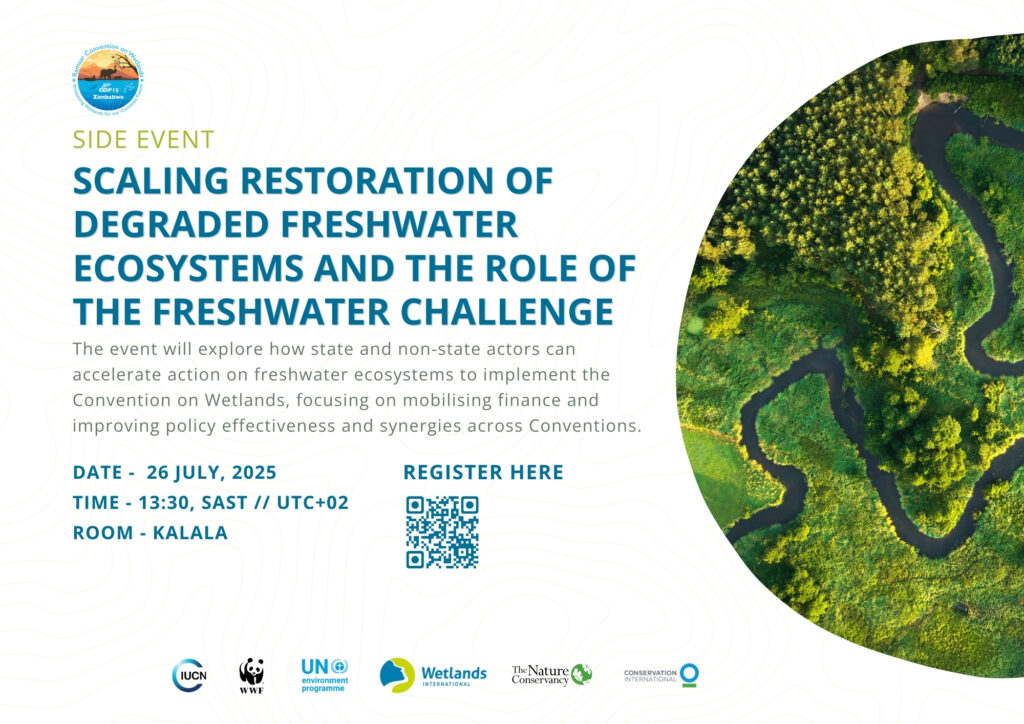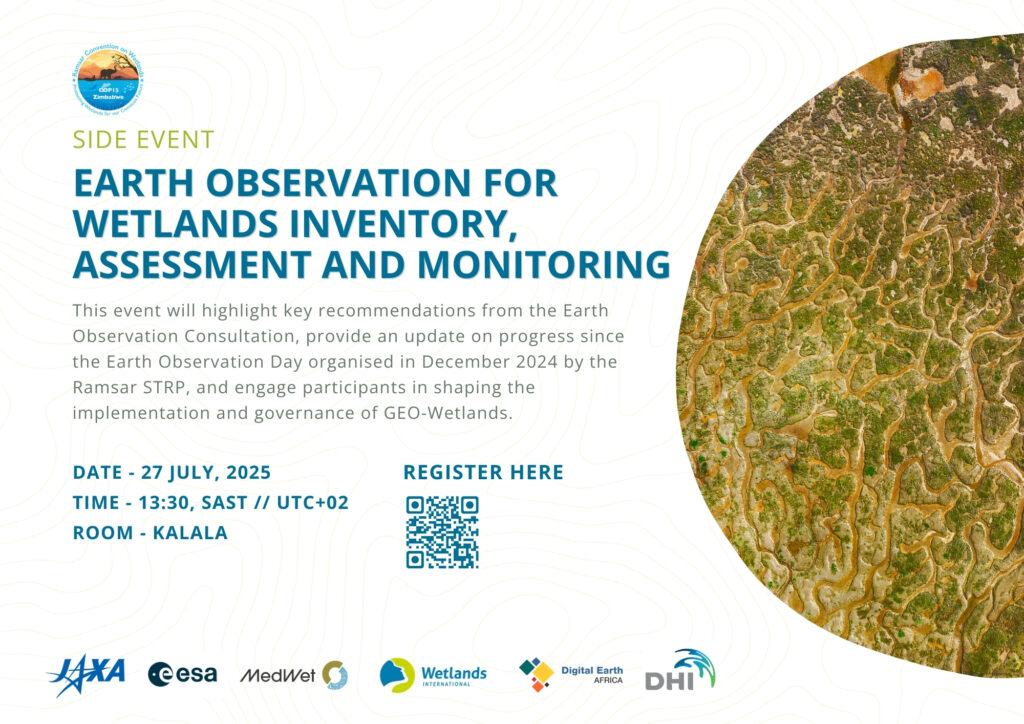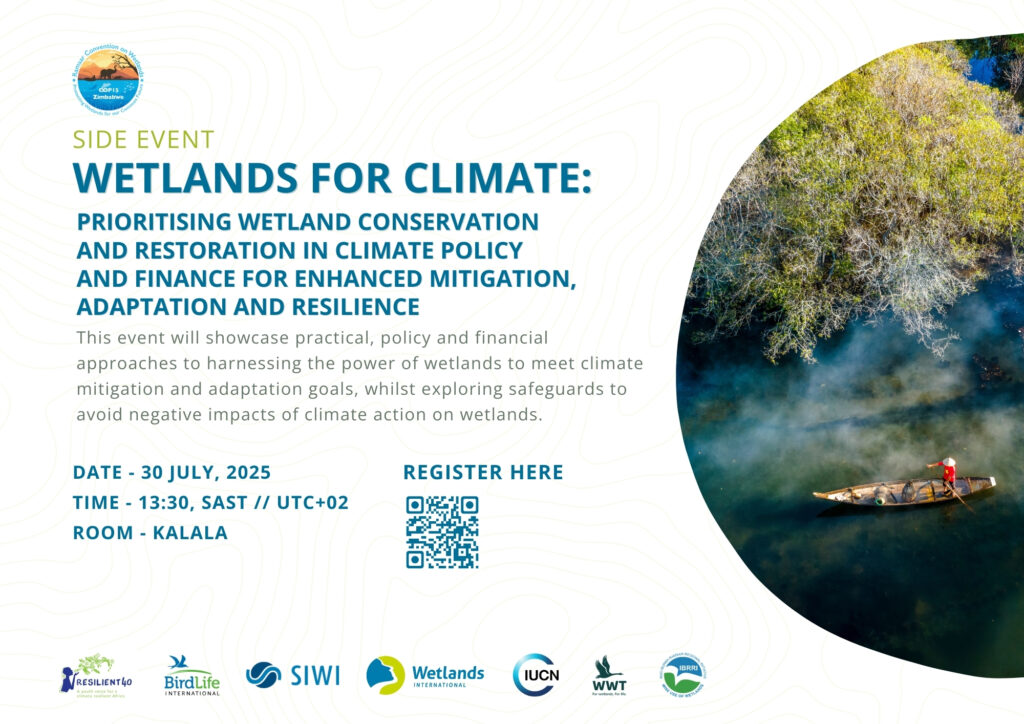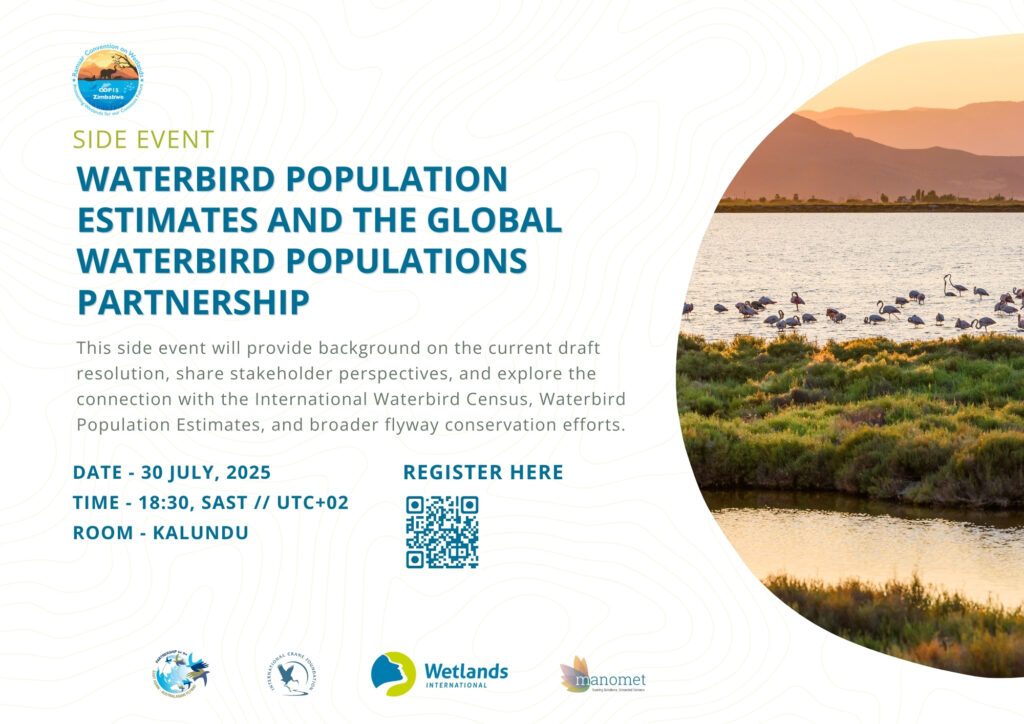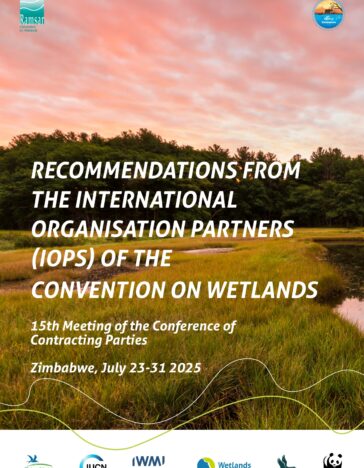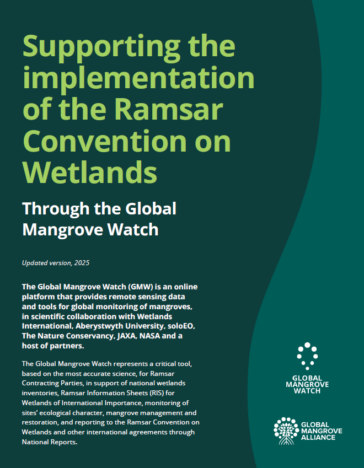
Wetlands International at Ramsar Convention on Wetlands COP15
The Ramsar Convention on Wetlands is the intergovernmental treaty that provides the framework for the conservation and wise use of wetlands and their resources. This July, leaders governments, experts, civil society organizations and other observers will convene for the15th Meeting of the Conference of the Contracting Parties (COP15). COP15 will be held under the theme, “Protecting Wetlands for Our Common Future”, which emphasizes the important role wetlands play in sustaining ecological health, biodiversity, and climate resilience. See here for more information.
During COP15, Contracting Parties will adopt the Convention on Wetlands 5th Strategic Plan, which will guide the Convention for the next decade. We call on Parties to approve a robust Strategic Plan, which includes clear goals and targets, a strong, measurable indicator framework aligned with other international reporting frameworks, and clear actions for Parties. The 5th Strategic Plan should align the Convention with the goals and targets of the Kunming-Montreal Global Biodiversity Framework (GBF) as well as the Sustainable Development Goals (SDGs).
Our Side Events
A slideshow with 4 images
The slider is set to loop infinitely.
Scaling restoration of degraded freshwater ecosystems and the role of the Freshwater Challenge
Date: 26 July
Time: 13:30
Room: Kalala
This side event will showcase global and regional leadership and national commitments and action to restore and protect freshwater ecosystems, including through the Freshwater Challenge. It will explore how state and non-state actors can accelerate action on freshwater ecosystems to implement the Convention on Wetlands, focusing on mobilising finance and improving policy effectiveness and synergies across Conventions.
Earth Observation for Wetlands Inventory, Assessment and Monitoring
Date: 27 July
Time: 13:30
Room: Kalala
This event will highlight key recommendations from the Earth Observation Consultation, provide an update on progress since the Earth Observation Day organised in December 2024 by the Ramsar STRP, and engage participants in shaping the implementation and governance of GEO-Wetlands. It will also explore partnership opportunities with Space Agencies, regional initiatives, and civil society actors.
Wetlands for climate: prioritising wetland conservation and restoration in climate policy and finance for enhanced mitigation, adaptation and resilience
Date: 30 July
Time: 13:30
Room: Kalala
This event will showcase practical, policy and financial approaches to harnessing the power of wetlands to meet climate mitigation and adaptation goals, whilst exploring safeguards to avoid negative impacts of climate action on wetlands. It will position wetland conservation and restoration as critical climate solutions to be prioritised in UNFCCC COP30 preparations and outcomes and at national level.
Waterbird Population Estimates and the global Waterbird Populations Partnership
Date: 30 July
Time: 18:30
Room: Kalundu
The programme of this side event is proposed to cover:
- Potential announcements of voluntary financial contributions to gWEP/WPE2027
- The current DR on gWEP and WPE2027 and its background
- Perspectives of stakeholders
- The link with the International Waterbird Census;
- Waterbird Population Estimates and Flyway Work
Also find us at:
Mobilizing Innovative Financing to Deliver the Objectives of the Convention on Wetlands
Time: 13:30
Room: Kalala
This high-level side event will explore how private sector investments and different types of financial mechanisms can contribute to wetland conservation, restoration, and sustainable management, as well as how Parties can better leverage existing institutional opportunities such as the GEF.
Connecting Wetlands, Flyways, People and Institutions
Date: 25 July
Time: 13:30
Room: Matetsi
This side event will:
- Explore the ecological, social and institutional aspects of connectivity of wetland networks across the world and come up with recommendations for Ramsar, based on experience from regional and national flyway initiatives and partners;
- Focus on finance needs and options to support wetland management and restoration and highlight opportunities for innovative funding across stakeholder groups;
- Share China’s experiences in flyway and wetland conservation through policy and practice, case study of OECMs for Spoon-billed Sandpiper, and CEPA initiatives in line with draft COP 15 resolutions.
From Resolution to Action: Youth Leadership and the Future of the Convention on Wetlands
Date: 25 July
Time: 18:30
Room: Gwayi
The side event will open with presentations from each Ramsar region, showcasing successful examples of youth engaging with Contracting Parties on wetlands projects and policy initiatives. These examples—from community initiatives and Indigenous knowledge to policy advocacy— will inspire and highlight effective models across diverse ecological and cultural contexts. The audience will then join an intergenerational facilitated panel discussion, to explore pathways for advancing the Convention on Wetlands and the COP14 Youth Resolution. To close the event, guests will have the opportunity to network informally
National Wetlands Inventories: Tools, Challenges and Opportunities across the Globe
Date: 26 July
Time: 18:30
Room: Kalundu
The main objective of the side event is to create awareness on National Wetlands Inventories (NWIs) and their value for policy and management decisions. The event will offer a platform for all stakeholders to discuss and exchange information regarding the current status, benefits, uses, limitations as well as suitable methodological approaches of NWI development, implementation and updating in their respective countries and regions. It will showcase challenges and opportunities in NWIs across the globe from four regions (Africa, Asia, the Americas and Europe) and will involve three Ramsar Regional Initiatives (SARRI, RAMCEA and MedWet). Lastly, it will enhance the understanding of Earth Observation (EO) technologies for wetlands monitoring.
Strengthening action on sustainable lifestyles and culture for wise use of wetlands – A key to transformative shifts in Ramsar’s impact
Date: 26 July
Time: 18:30
Room: Matetsi
In the side event, a range of eminent voices will provide a guide to latest developments and the springboard that 2025 provides for new energy and new understandings about the relationship between sustainable lifestyles, culture and wetlands. Crucially, it will also be a key occasion at the COP for discussing the Draft Resolutions on Strengthening action on culture and wetland and on promoting sustainable lifestyles for the wise use of wetlands.
Delivering science to support the Convention – future priorities for the STRP
Date: 27 July
Time: 18:30
Room: Gwayi
The session will share and discuss the STRP outputs for the 2023-2025 triennium, including STRP publications on OECMs, Small Wetlands, Blue Carbon, Agriculture and the Kunming-Montreal Global Biodiversity Framework. It will ask participants how the delivery of science can be enhanced to support the Convention at national, regional and global scales. STRP members will present the key messages from wetland assessment reports and participate in an interactive discussion on emerging issues relating to the science-policy interface and the drivers pf wetland loss and degradation.
Wetlands at risk: Tools, standards, and policies for maintaining and enhancing ecological character, addressing threats and achieving global conservation targets
Date: 28 July
Time: 13:30
Room: Gwayi
This side event brings together two interconnected priorities: addressing threats to wetlands to allow the removal of sites from the Montreux record; and enhancing the governance and management effectiveness of Ramsar Sites. It will present practical and effective strategies to address wetlands at risk, and showcase global standards, tools, model policy frameworks and other resources that can benefit Contracting Parties.
Rights of Nature in Wetlands: Transformative Change to Meet Global Challenges
Date: 28 July
Time: 13:30
Room: Kalundu
In this side event, speakers will present global examples (e.g. Bolivia, Brazil, Ecuador, Guyana, Kenya, and Sri Lanka) where Rights of Wetlands are being implemented/operationalized within legal frameworks and as community practices. Discussion will explore how the Rights of Wetlands approach can support the Convention on Wetlands implementation and how it shifts our relationship with wetlands and nature more broadly, thus benefiting wetlands and the living beings that inhabit them, including humans.
Capturing Climate Adaptation Co-Benefits of Wetlands
Date: 30 July
Time: 13:30
Room: Gwayi
This side event will feature launch of the online co-benefit assessment tool and a moderated panel discussion with policy makers, scientific experts and practitioners on opportunities for mainstreaming adaptation co-benefits in wetland management plans and investments. The event will provide Contracting Parties with an opportunity to learn about the co-benefit assessment methodology and explore potential areas for its application within their respective domains.
Regional collaboration for strengthening wetlands conservation in South Asia
Date: 30 July
Time: 18:30
Room: Kazuma
This side event aims to take further steps towards establishing the Ramsar South Asia Regional Initiative by affirming the regional initiative’s programmatic framework, governance and implementation modalities. The overall programmatic framework for establishing the Regional Initiative shall be presented and inputs of the national focal points and stakeholders taken on governance and overall implementation. Discussions at the side event are aligned with the overall CoP theme as they enable collective and collaborative action for wetlands conservation.
Empowering Youth: Capacity Development and Youth Engagement in Wetland Conservation and Sustainable Development
Date: 30 July
Time: 18:30
Room: Gwayi
This side event will reflect on the various capacity development activities offered by humanitarian, development and environmental organizations on a global scale, including Ramsar International Organization Partners, Official Observer Organizations and more. The event will ask the question if the current offers fully cover the needs of young people active in wetland conservation and sustainable use. Several NGOs, CSOs and UN agencies will give a short and concrete overview over their activities in capacity development and youth involvement related to wetlands in short pitches.
Iniciativa Mundial sobre las Turberas: Promoviendo la colaboración Sur-Sur en favor de las turberas
Date: 30 July
Time: 18:30
Room: Matetsi
Event will occur in Spanish.
This side event brings together Contracting Parties, GTI partners, and key stakeholders to share ambitions for advancing peatland policies, practices, and partnerships, exchange good practices and lessons learned, and actively contribute to shaping the next phase of the 10-Year Peatland Strategy.

